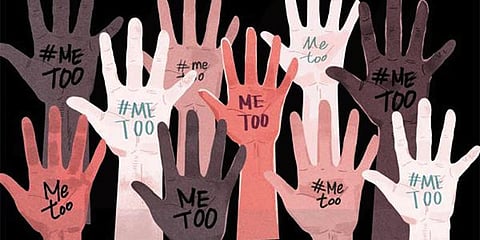

In countries without a Constitutional free speech defense, women reporting sexual harassment and newspapers reporting on those allegations are finding themselves sued for defamation, losing in court, and thus silenced, says DAVID B. OPENHEIMER, Clinical Professor of Law and Director of the Berkeley Center on Comparitive Equality and Anti Discrimination Law, University of California, Berkeley. This an excerpt from Defamation Law is Being Weaponized to Destroy the Global #MeToo Movement: Can Free Speech Protections Help Counter the Impact? from the book, The Global #MeToo Movement published by Full Court Press.
—–
As Aileen McColgan reports in her chapter on the United Kingdom, "Silent Women? Non-Disclosure Agreements and the #MeToo Movement in the United Kingdom", there too the survivor of sexual assault who reports it publicly may find herself on the wrong side of a defamation case. And if she does, the burden will be on her to prove the truth of her assault, rather than requiring that her assailant prove its falsehood. McColgan's report on the Stocker v. Stocker case is especially speech chilling. There, a woman who complained about her ex-husband having tried to strangle her was found liable for an award of £5,000, with £200,000 costs, despite considerable evidence that he did try to strangle her (including bruises on her neck), and that he had a history of violence.
In the Israel chapter, "Sexual Harassment Law in Israel and the #MeToo Challenge", by Israeli Supreme Court Justice Daphne Barak-Erez, defamation is again identified as a weapon used to silence women. Justice Barak-Erez explains that in Israel, "the defendant to a defamation suit bears the burden of proving that her statement was truthful and convincing the court that a public interest rationale supported its publication." As an example of how survivors are silenced, she points to the Uri Daniel case (in which she filed a dissenting opinion in the Supreme Court). Four women reported being raped by the same man. The police wouldn't investigate because too much time had elapsed, so the women brought a civil action against him; he counter-claimed for defamation. Their claims against him were dismissed as untimely, but his defamation claims against them was permitted to move forward.
In Puja Kapai's chapter on Hong Kong, she describes women in Hong Kong and elsewhere in China as fearing that if they report being harassed, they would be "blamed as troublemakers and sued for defamation." She recounts that in China, "Only two cases on the public record have ever been pursued against perpetrators of sexual harassment in the workplace as compared with hundreds of countersuits that have been brought by men accused of sexual harassment against their accusers. This demonstrates clearly the power of the law but also, how male perpetrators feel empowered to use the full force of the law to threaten and muzzle their accusers, rare as it is to have them speak out."
A final example, from the US again, and my own home institution of the University of California at Berkeley, illustrates the strength of the United States' free speech protections. Here in California, as in many states, we have given further effect to the free speech defense by passing a law that permits early dismissal of defamation cases when they are being used as "strategic litigation against public participation (SLAPP)."
In 2012, the University of California at Berkeley hired Blake Wentworth as an assistant professor. Nicole Hemenway, an undergraduate, asked him to be her thesis advisor in 2014. By 2016, Hemenway had come forward with a formal complaint to the University. Hemenway complained that Wentworth overshared details about his personal life, told Hemenway that she was "a gorgeous young woman" who would be an "obvious target" for sexual harassment, called her "honey" and implied they could have a sexual relationship after she graduated, and put his hands on her while complimenting her and staring intensely into her eyes. An investigation conducted by the University determined that Wentworth had sexually harassed four students, including Hemenway.
Hemenway made a total of nine statements to two newspapers in 2016 as issues like hers were covered in mainstream media. In response to Hemenway's statements to the press, Wentworth filed a defamation suit. In response to Wentworth's defamation action, Hemenway filed an anti-SLAPP motion. The court determined that Wentworth was unlikely to be able to prove Constitutional malice, and that his lawsuit was brought to silence Hemenway, thus unduly interfering with her free speech rights on an important issue of public concern. The court thus dismissed Wentworth's action, entering a judgment in favor of Hemenway.
This and the other cases in this chapter serve to illustrate a number of important points. First, defamation law has been weaponized to silence women who complain about sexual harassment, and others who report misconduct. Whether be they whistle-blowers, investigative reporters, activists seeking support, or #MeToo tweeters, the law should shield them, not silence them. Second, if the law fails to protect the right to speak out about abuses like sexual harassment and violence, those who benefit from unequal power will use that power to sustain inequality, including gender inequality. Third, if we truly value free speech, and recognize the importance of speaking truth to power, we can create free speech defenses to defamation laws. We can adopt these protections by interpreting existing free speech rights in international conventions and national constitutions and by legislative code reform. The path is clear; the cost of inaction is intolerable.
(DAVID B. OPENHEIMER, is Clinical Professor of Law and Director of the Berkeley Center on Comparitive Equality and Anti Discrimination Law, University of California, Berkeley. The views are personal.)